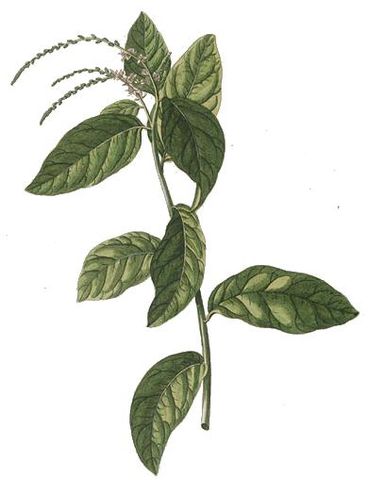Common Names and Other Names:
- Anamu
- Guinea Hen Weed
- Gully Root
- Garlic Weed
Where Does It Occur:
Anamu is native to:
- Amazon Rainforest
- Central America
- Caribbean
- Tropical areas of South America
It thrives in:
- Tropical forests
- Rainforests
- Areas near water sources
Basic Ingredients (Constituents):
Anamu contains several bioactive compounds:
- Dibenzyl Trisulfide
- Phenylpropanoids
- Flavonoids
- Triterpenes
- Sulfur Compounds similar to those found in garlic
These constituents are known for their antimicrobial, antifungal, anticancer, and immune-boosting properties.
Most Commonly Used For Treatment Of:
- Immune System Support:
- Known to enhance immune function and has anti-inflammatory effects.
- Antimicrobial and Antifungal Properties:
- Used to treat infections and as a general antimicrobial agent.
- Cancer:
- Traditional use in cancer treatment, supported by preliminary research showing its potential to slow cancer cell growth.
- Pain Relief:
- Used for its analgesic properties to treat headaches and general body pain.
- Diabetes:
- Believed to help manage blood sugar levels.
- Antiparasitic Uses:
- Used traditionally to treat a variety of parasitic infections.
Side Effects:
While Anamu is valued for its medicinal properties, it can have side effects:
- Blood Thinning:
- Has anticoagulant properties; can increase the risk of bleeding, particularly in people on blood-thinning medications.
- Allergic Reactions:
- May cause allergic reactions in sensitive individuals.
- Gastrointestinal Distress:
- High doses can cause nausea, vomiting, or diarrhea.
- Pregnancy:
- Not recommended for use during pregnancy due to potential effects on the uterus.
Available Forms in the Market:
- Dried Leaves and Roots:
- Often used to make teas or decoctions.
- Capsules and Tablets:
- Available as dietary supplements.
- Tinctures:
- Concentrated liquid extracts used for various therapeutic purposes.
- Powders:
- Can be added to smoothies or other beverages for consumption.
Research and Results:
- Cancer Research:
- Study: Investigations into Anamu’s effects on cancer cells have shown potential in reducing the proliferation of several cancer cell lines.
- Findings: The active compounds, including dibenzyl trisulfide, have been observed to induce apoptosis (cell death) in cancer cells.
- Antimicrobial Activity:
- Study: Anamu has been tested against a variety of bacteria and fungi, showing good inhibitory effects.
- Findings: Effective against several pathogens, including those resistant to standard antibiotics.
Precautions:
- Consult a Healthcare Provider:
- Due to its potent effects and potential interactions with medications, it’s important to consult a healthcare provider before starting any new treatment with Anamu, especially for those with pre-existing conditions or those who are pregnant or breastfeeding.
- Dosage:
- Should be carefully monitored to avoid potential side effects.
- Medication Interactions:
- Particularly with anticoagulants and medications metabolized by the liver.
Conclusion:
Anamu (Petiveria alliacea) is a powerful herb known for its extensive use in traditional medicine, particularly in Central and South America. It offers potential health benefits, including immune system support, anticancer properties, and antimicrobial activity. However, due to its strong biological effects, proper caution should be exercised regarding its use and dosage.
Disclaimer:
This information is for educational purposes only and is not intended to replace professional medical advice. Always consult with a healthcare professional before starting any new dietary supplement or treatment.
« Back to Glossary Index